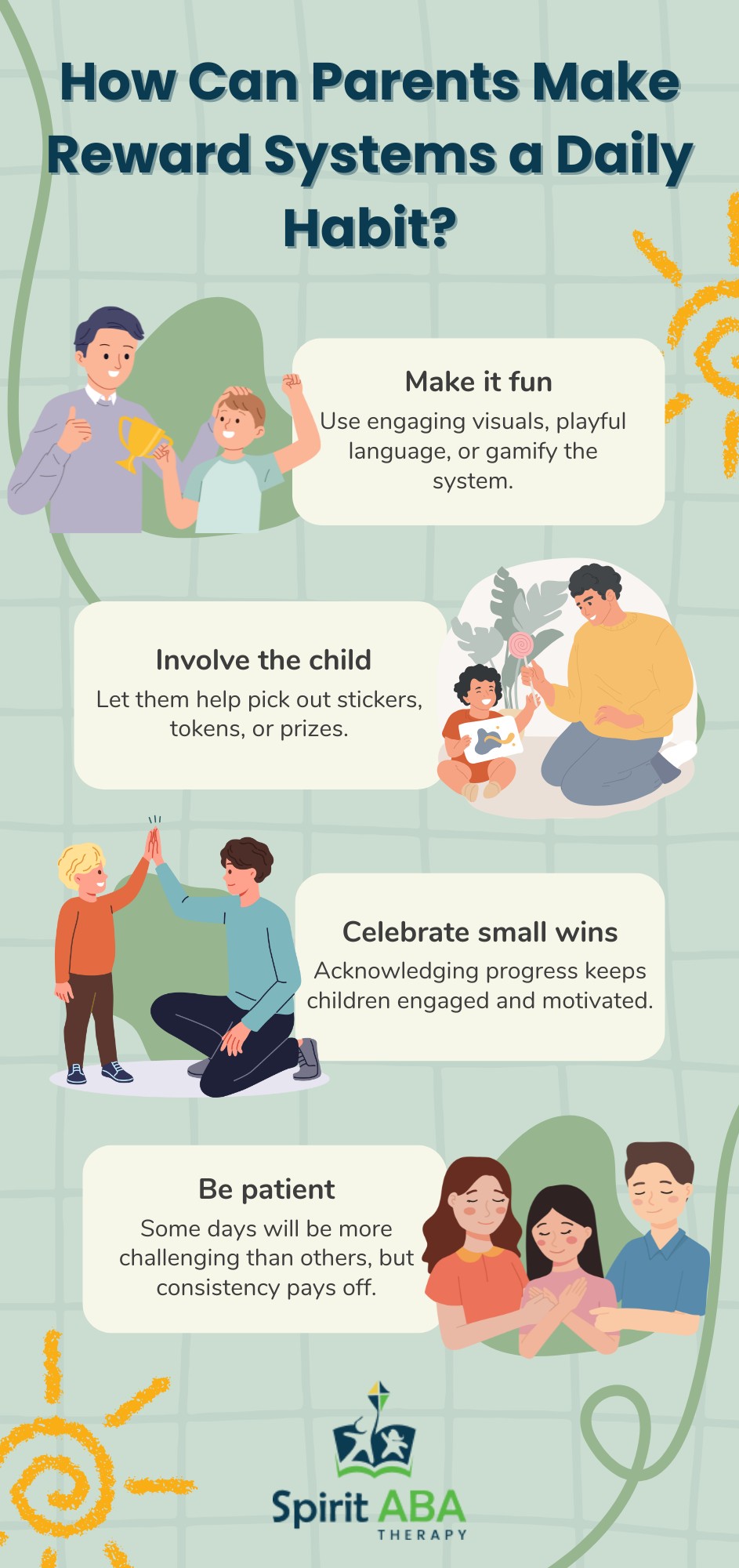Key Points:
- Reward systems help children with autism by reinforcing positive behaviors and encouraging skill development.
- Different types of rewards—tangible, social, and activity-based—can be tailored to each child’s unique needs.
- Consistency and proper reinforcement are crucial for making reward systems effective in daily life.
Motivating children with autism can sometimes feel like a puzzle. Standard discipline methods might not work, and frustration can build. The key? A well-structured reward system. By using the right incentives, you can encourage positive behaviors, reinforce learning, and help your child thrive in a way that feels enjoyable.
Why Are Reward Systems Important for Children with Autism?
Children with autism often thrive in structured environments where expectations are clear. A well-designed reward system provides positive reinforcement, helping them understand which behaviors are encouraged. By consistently rewarding desired actions, children are more likely to develop good habits and reduce problem behaviors.
These systems also promote independence by reinforcing self-care skills like brushing teeth or getting dressed. They can improve social interactions by encouraging eye contact, turn-taking, and communication. Additionally, rewards build self-confidence by giving children a sense of accomplishment.
Since motivation can be different for each child, tailoring the reward system to their preferences—whether through tangible rewards, praise, or favorite activities—ensures success. When used correctly, reward systems make learning and behavior management smoother for both parents and children.

What Types of Rewards Work Best for Children with Autism?
Not all children respond to the same types of rewards. To be effective, a reward must be meaningful and motivating for the individual child. Here are three major types of rewards commonly used in autism therapy:
Tangible Rewards
Some children respond best to physical rewards that they can see or touch. These may include:
- Stickers, tokens, or small toys
- Favorite snacks (used in moderation)
- Access to a special item (e.g., a new book or game)
Social Rewards
Social rewards help reinforce positive interactions and can be used to encourage communication skills. These might include:
- Praise and encouragement (“Great job putting away your toys!”)
- High-fives, hugs, or thumbs-up
- Extra attention or one-on-one time with a parent or teacher
Activity-Based Rewards
For some children, experiences are more valuable than physical rewards. Activity-based rewards could involve:
- Extra time playing a favorite game
- Watching a preferred TV show or movie
- A trip to the playground or another favorite place
By using the right type of reward, parents and educators can create motivation that feels natural and enjoyable for the child.
How to Set Up an Effective Autism Reward System
A successful reward system requires structure, consistency, and clear expectations. Here’s how to implement one:
1. Identify the Target Behavior
Before introducing rewards, define specific behaviors you want to encourage. These could include:
- Using words instead of tantrums
- Following a bedtime routine
- Completing schoolwork without resistance
Make sure the behavior is clear and measurable so your child understands what is expected.
2. Choose the Right Reward
Select a highly motivating reward based on your child’s interests. If they love music, earning time with a favorite song could be effective. If they enjoy physical play, access to a trampoline or swing could work.
3. Use a Visual System
Many children with autism benefit from visual cues. Consider using:
- Sticker charts
- Token boards
- Checklists with pictures or symbols
Visual aids help children track their progress and see how close they are to earning a reward.
4. Reinforce Immediately and Consistently
Rewards should be given right after the desired behavior happens. Immediate reinforcement helps the child connect the reward with the behavior.
- If using a sticker chart, place the sticker right after the behavior occurs.
- If giving praise, be enthusiastic and specific (“I love how you shared your toy!”).
5. Gradually Increase Expectations
Once your child gets used to the system, you can slowly increase the difficulty of the task. For example:
- If a child earns a reward after brushing their teeth once, increase it to two nights in a row before receiving the prize.
- Instead of rewarding every small success, shift to bigger accomplishments over time.
This approach builds long-term habits and encourages greater independence.
How Can Parents Make Reward Systems a Daily Habit?
A reward system should feel like a natural part of daily life rather than a separate task. Here’s how to integrate it seamlessly:

By turning rewards into a positive experience, children are more likely to engage in desired behaviors long-term.
Common Mistakes to Avoid in Autism Reward Systems
Even the best reward system can fail if not implemented correctly. Watch out for these common mistakes:
Inconsistent Reinforcement
If a child earns a reward sometimes but not others, they may lose motivation. Make sure rewards are consistent and always tied to the target behavior.
Using Rewards That Aren’t Motivating
If a reward doesn’t excite the child, it won’t work. Keep testing different incentives to find what truly motivates them.
Expecting Immediate Results
Behavior change takes time. If a system isn’t working right away, make small adjustments rather than abandoning it.
Accidentally Reinforcing Negative Behavior
Be mindful not to reward challenging behaviors unintentionally. For example, if a child receives extra screen time after a tantrum, they may learn that meltdowns lead to rewards.
Find Personalized ABA Support at Spirit ABA
Creating an effective autism reward system takes time, patience, and expertise. If you need guidance, Spirit ABA offers expert ABA therapy services tailored to your child’s unique needs.
Our experienced therapists use evidence-based strategies to reinforce positive behaviors and build essential skills. Whether your child needs help with communication, social interactions, or daily routines, our team is here to support them.
We proudly provide ABA therapy services in Iowa, Colorado and Nebraska. Contact us today to learn how ABA therapy can help your child thrive!


